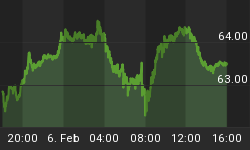While the investment community is doing back flips over this morning's release from the Bureau of Labor Statistics that non farm payrolls were up a softer than expected 121k, I think investors' attention should be more focused on recent activity from central banks rather than unemployment rates that have no correlation to inflation.
The overemphasis of labor rates serves as a red herring for what is the real economic story, which is the temporary attempt at sanity from central bankers around the world which should engender a global economic slowdown or recession. Today, twenty-four of the twenty eight major global central banks are raising interest rates or have served notice of their intention to tighten monetary policy. This monetary draining of liquidity is likely to be short-lived, but the implications of this round of global tightening could lead to still lower commodity and stock prices in the near term.
Paradoxically, recent global liquidity excess also underpinned our bond market as investors sought a higher yield for their free money and bid up these fixed income vehicles along w/other assets of all types. Thus, even though I believe a recession is likely in 2007 (which would normally lead to lower interest rates), I suspect U.S. Treasury yields may continue to slowly climb because of the dissolution of foreign buyers.
While global G.D.P. rates have been robust, much of that growth stemmed from excessive monetary stimulus. For example, according to the World Bank, China's G.D.P. rate for 2006 should be 9.5%. The Peoples Bank of China reported the growth of M-2 money supply was over 19% in the beginning of this year and is targeted at 16% for the rest of '06 (though it must be said there are rumors swirling at the moment that the Peoples' Bank of China has scheduled an emergency meeting, perhaps to widen the trading band of the Yuan, a de-facto tightening of the money supply). With money supply growing at twice the rate of G.D.P., how much of China's growth is real and how much is simply inflation?
The true rate of growth for China or any economy is elicited from people becoming more productive through working harder or from advances in technology. And in some cases, a significant increase in labor force numbers can lead to higher rates of G.D.P. These phenomena, however, do not occur with facility and result in small rates of change in growth. Lofty rates of G.D.P. growth are usually accompanied by high rates of monetary growth.
When inflation eventually manages to make its way into massaged government statistics, central banks try to cover their tracks by claiming growth is becoming intractable and needs to be quelled. They sell treasuries to dealer banks and through a reverse repurchase agreement, temporarily take money out of the system. These are the consequences of abrogating the gold standard and relying on central bankers to micromanage the economy by raising or lowering the money supply, leading to an economy dependent on the creation of new debt, debt which is either monetized by the fed or bought by a foreign entity, then through the fractional reserve system is further expanded, increasing the money supply.
So with the global economy slowing and interest rates on the rise, can U.S. investors hope for a bail out of their balance sheets from the stock market? Well, the market remains overvalued in historical terms, currently trading at 17.7 times last year's earnings vs. an average of 14.5 since 1872, so stocks are likely to be range-bound, at best. With the growth of earnings slowing, how much upside is there for the major averages? If I am correct, there are not many places for investors to park their money while they wait for central bankers to resume their inflationary tendencies (which may not take long given their history). For now, I recommend a cautious overall posture and suggest high dividend paying non-dollar denominated equities as a potential hiding place for a portion of one's assets.
**Investors are increasingly turning to Canada for energy sector exposure as they search for hedges against inflation. To learn more, get "Go North!" our exclusive, free report on Canadian royalty trusts.















